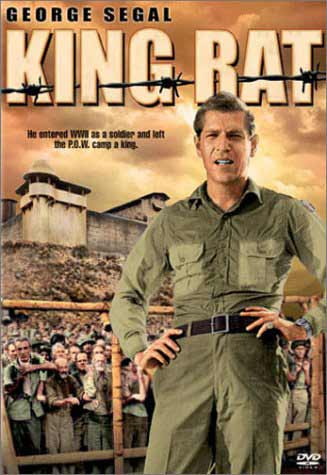The Movie
This is the darkest movie I've ever seen. Billy Wilder's Ace in the Hole still wins for pure cynicism, and Joseph Wambaugh's novel The Glitter Dome has the Street Monsters for comic relief. But for pure darkness--this one beats everything.
You're warned at the beginning that this won't be your typical POW movie. Unlike Stalag 17 or The Great Escape or even The Bridge over the River Kwai , King Rat has no escapes. King Rat is about survival at any cost.
Actually it's about corruption. George Segal is an American POW Corporal King, sitting out the war in a Singapore prison comprised mostly of British POWs. He's very much like Sefton in Stalag 17--he's the sharp guy, the wiseguy--the guy who's got everything and lives well while everyone else lives in squalor. Back in the states he'd be a goodfella--a mafioso. Here in camp he's The Godfather.
The movie's really about two characters, Tom Courtnay's Lt. Gray and James Fox's Peter Marlowe. Gray hates King, Marlowe likes him. As the story unfolds, Marlowe gradually begins working for King, first as a friend and later as an employee, and as such he runs afoul of Gray. At first it looks like King is the crime lord, but it gradually becomes clear that he's simply the most visible--the infection of evil and corruption runs deep and is spread much farther than anyone realizes.
Every bit of sentiment is ruthlessly removed from this movie. Here you're a player or a sucker, and woe to the suckers. But it was beautifully done--by the end I felt Fox and Gray's dismay profoundly. Their worlds had been rocked more by their comrades than by anything the Japanese could have done.
A feel-good movie? No way. Not a bit. But it doesn't pander to anything or anybody, and I admire that. The characters are fascinating. It's a war movie that breaks every convention that I've seen--it's like no other war movie I can think of. It's a movie of substance and depth where most movies, even those which try to be tough, are typically fantasies.
|
